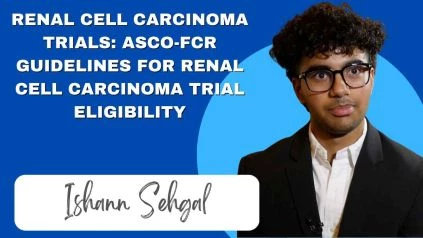Renal Cell Carcinoma Trials: ASCO-FCR Guidelines for Renal Cell Carcinoma Trial Eligibility Ishann Sehgal
by Ishann Sehgal, City of Hope – Friends of Cancer Research
So my poster is about Eligibility Criteria Towards Retinal Cell Carcinoma, which is kidney cancer. And our results were that HIV positivity and Hepatitis B and C positivity were most exclusive to patient. And also that brain metastases and concurrent malignancies were very inclusive towards patients.
What are questions you received from oncologists about your poster?
So some of the questions were, what are next steps after this study and what we found was we go into specific phases of the study and go more deeper into the research in that.
What is the future for the topics you brought up in your poster?
What I thought was interesting was that mostly HIV positivity had the higher exclusive criteria. And I wanna know more if it has something to do with race or people’s upbringing towards HIV. So I would like to look into that.
About the Poster on Renal Cell Carcinoma Clinical Trials
The poster “Evaluation of eligibility criteria in contemporary renal cell carcinoma trials based on ASCO-FCR recommendations” examines the eligibility criteria used in clinical trials for renal cell carcinoma (RCC) and evaluates their alignment with the American Society of Clinical Oncology and Friends of Cancer Research (ASCO-FCR) recommendations.
The poster found that while the majority of the analyzed clinical trials adhered to the ASCO-FCR recommendations regarding inclusion criteria, there were still some areas where improvement could be made. Specifically, the authors found that some clinical trials had overly restrictive eligibility criteria that may limit patient enrollment and generalizability of the trial results.
The poster suggests that greater attention should be paid to aligning clinical trial eligibility criteria with ASCO-FCR recommendations, which could lead to improved patient enrollment, greater generalizability of clinical trial results, and ultimately, better treatment options for patients with RCC.
What is renal cell carcinoma and where are the clinical trials going in 2023?
Renal cell carcinoma (RCC) is a type of kidney cancer that develops in the cells of the lining of small tubes in the kidney called tubules. It is the most common type of kidney cancer in adults, accounting for about 90% of all cases.
There are several different subtypes of RCC, including clear cell, papillary, chromophobe, and others. Clear cell RCC is the most common subtype, accounting for about 70% of all cases.
As for clinical trials in 2023, it is difficult to predict exactly where research will be focused, as clinical trials are constantly evolving and new studies are being initiated all the time. However, there are several areas of ongoing research and development for RCC treatments, including:
Immunotherapy: Immunotherapy drugs work by stimulating the immune system to attack cancer cells. Several immunotherapy drugs have been approved for the treatment of RCC, including checkpoint inhibitors such as nivolumab and ipilimumab.
Targeted therapy: Targeted therapy drugs work by targeting specific proteins or pathways that are involved in the growth and spread of cancer cells. Several targeted therapy drugs have been approved for the treatment of RCC, including tyrosine kinase inhibitors such as sunitinib and pazopanib.
Combination therapies: Researchers are studying combinations of different drugs to see if they can improve outcomes for patients with RCC. For example, some clinical trials are testing combinations of immunotherapy and targeted therapy drugs.
Biomarkers: Researchers are investigating biomarkers that can help identify patients who are most likely to benefit from certain treatments. For example, some trials are looking at biomarkers that may predict response to immunotherapy drugs.
Overall, the goal of clinical trials in RCC is to improve outcomes for patients by developing more effective and personalized treatments. It is important for patients with RCC to discuss their treatment options with their healthcare provider and to consider participating in clinical trials if they are eligible.
Ishann Sehgal – About The Author, Credentials, and Affiliations
Ishann Sehgal has greatly benefited from Dr. Pal’s guidance and support in the City of Hope – Friends of Cancer Research program. Dr. Pal has helped Ishann develop a strong foundation in medical oncology by providing him with opportunities to participate in cutting-edge research and clinical trials. Under Dr. Pal’s mentorship, Ishann has been able to develop his future skills as a physician or researcher, paving the way for a successful career in the field.
Dr. Monty Pal is a highly regarded physician and researcher who has made substantial contributions to the field of medical oncology. Dr. Pal has also distinguished himself as an exceptional mentor who has guided and inspired a large number of young researchers and doctors, including Ishann Sehgal.
Dr. Pal is renowned for his dedication to encouraging the professional growth and development of his mentees by providing them with the necessary tools and assistance. Dr. Pal has inspired many aspiring oncologists to make their own contributions to the field by assisting them in the development of their skills and expertise.
Overall, Dr. Pal’s dedication to mentoring has helped mold the next generation of oncologists, and his influence on the field will be seen for decades to come.

